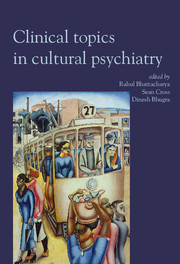Book contents
- Frontmatter
- Dedication
- Contents
- List of tables
- List of boxes
- List of figures
- List of contributors
- Preface
- Part 1 Theoretical and general issues
- 1 Globalisation, psychiatry and human rights: new challenges for the 21st century
- 2 Migration and mental illness
- 3 Mental health of refugees and asylum seekers
- 4 Racism, racial life events and mental ill health
- 5 Expressed emotion across cultures
- 6 Mental illness in Black and Asian ethnic minorities: care pathways and outcomes
- 7 Poverty, social inequality and mental health
- Part 2 Specific mental health conditions across cultures
- Part 3 Management issues in the cultural context
- Index
4 - Racism, racial life events and mental ill health
from Part 1 - Theoretical and general issues
Published online by Cambridge University Press: 02 January 2018
- Frontmatter
- Dedication
- Contents
- List of tables
- List of boxes
- List of figures
- List of contributors
- Preface
- Part 1 Theoretical and general issues
- 1 Globalisation, psychiatry and human rights: new challenges for the 21st century
- 2 Migration and mental illness
- 3 Mental health of refugees and asylum seekers
- 4 Racism, racial life events and mental ill health
- 5 Expressed emotion across cultures
- 6 Mental illness in Black and Asian ethnic minorities: care pathways and outcomes
- 7 Poverty, social inequality and mental health
- Part 2 Specific mental health conditions across cultures
- Part 3 Management issues in the cultural context
- Index
Summary
Summary Life events are a universal experience that everyone undergoes, However, the individual response to life events, whether they are negative (loss, bereavement, etc.) or positive (new house, new job) must be seen in a cultural context. Different cultures place differing emphasis on the significance of these events. Coping strategies are also influenced by cultures. Life events which are attributed to racism can affect vulnerable individuals. In this chapter, we review the literature, focusing on work related to racism, racial life events and mental illness. Race is a biological aspect and race is behaviour related to control of power and resources away from races deemed to be inferior.
The association of life events with the onset of various psychiatric disorders is well known. The body of evidence has highlighted the impact of negative or positive life events on the genesis of common mental disorders, especially depression. These findings have been replicated across different cultures, although the effect of different life events varies between cultures. In addition, the role of chronic difficulties (see p. 43) and resulting ongoing chronic stress have been shown to contribute to vulnerability to certain mental illnesses. However, data on the impact of life events, especially those perceived as racial, on members of minority ethnic groups are rather sparse. The questions that need to be addressed concern the perception of life events as racial, the role of pervasive and perceived institutional and individual racism, and chronic difficulties. In this review, we aim to draw the clinician's attention to some of these key factors, which may precipitate or perpetuate ongoing psychiatric problems.
Race, ethnicity and racism
Race and ethnicity
Until the middle of the 20th century race was used as a Darwinian tool to emphasise that Black people were inferior and savage compared with White people. This was accepted as a biological fact by the scientific community, thereby giving it a scientific legitimacy. Racism takes several forms and occurs both at individual and institutional levels.
- Type
- Chapter
- Information
- Clinical Topics in Cultural Psychiatry , pp. 39 - 51Publisher: Royal College of PsychiatristsPrint publication year: 2010



